|
|
|
 ONE CROWDED LIFE BEHIND A CAMERA
- By Terry Plane, March 2003 ONE CROWDED LIFE BEHIND A CAMERA
- By Terry Plane, March 2003
-
 CYPRUS FRIENDS PAY TRIBUTE TO
CAMERAMAN KILLED IN IRAQ
- By Sofia Kannas, March 2003 CYPRUS FRIENDS PAY TRIBUTE TO
CAMERAMAN KILLED IN IRAQ
- By Sofia Kannas, March 2003
-
 MEMORIAL CRICKET IN BAHRAIN - By Charles Haine, March 2003 MEMORIAL CRICKET IN BAHRAIN - By Charles Haine, March 2003
-
 RORY PECK AWARDS CEREMONY - By Allison Havey, October 2003 RORY PECK AWARDS CEREMONY - By Allison Havey, October 2003
-
 MEMORIAL SERVICE FOR JOURNALISTS,
ST, BRIDE'S CHURCH, FLEET STREET - By Francis Collins, October 2003 MEMORIAL SERVICE FOR JOURNALISTS,
ST, BRIDE'S CHURCH, FLEET STREET - By Francis Collins, October 2003
-
 AUSTRALIAN STORY - ABC Broadcast, October 2003 AUSTRALIAN STORY - ABC Broadcast, October 2003
-
 MELBOURNE PRESS CLUB AWARDS - By Verity Moran, March 2004 MELBOURNE PRESS CLUB AWARDS - By Verity Moran, March 2004
-
 NATIONAL PUBLIC RADIO WAR DIARES - By Lynn McConaughey, March 2003 NATIONAL PUBLIC RADIO WAR DIARES - By Lynn McConaughey, March 2003
-
 WASHINGTON, D.C. MEMORIAL
- By May Roustom, March 2003 WASHINGTON, D.C. MEMORIAL
- By May Roustom, March 2003
-
 ROTARIANS BRING A BREATH OF COMPASSION
TO BAGHDAD - By
Liz Gooch, September 2004 ROTARIANS BRING A BREATH OF COMPASSION
TO BAGHDAD - By
Liz Gooch, September 2004
-
 THROUGH AUSTRALIAN EYES ABC FOREIGN
CORRESPONDENTS EXHIBITION IN SYDNEY - May 2004 THROUGH AUSTRALIAN EYES ABC FOREIGN
CORRESPONDENTS EXHIBITION IN SYDNEY - May 2004
-
 THE FREEDOM FORUM JOURNALISTS' MEMORIAL
- Washington DC, May 2004 THE FREEDOM FORUM JOURNALISTS' MEMORIAL
- Washington DC, May 2004
-
 WAKE AT ADELAIDE SACRED HEART
OVAL - By Andrew
Porteous, April 2003 WAKE AT ADELAIDE SACRED HEART
OVAL - By Andrew
Porteous, April 2003
-
 GALA DINNER AT GLENELG FOOTBALL
CLUB - By Robert
Buchan, July 2003 GALA DINNER AT GLENELG FOOTBALL
CLUB - By Robert
Buchan, July 2003
-
 A BOOK PAYS A TRIBUTE TO JOURNALISTS
By Chris Cramer, November 2003 A BOOK PAYS A TRIBUTE TO JOURNALISTS
By Chris Cramer, November 2003
-
 LONDON HOME HOUSE MEMORIAL
- By Allison Harvey, May 2003 LONDON HOME HOUSE MEMORIAL
- By Allison Harvey, May 2003
-
 THE PAUL MORAN MEMORIAL
TROPHY - By Mark Seaman, March 2005 THE PAUL MORAN MEMORIAL
TROPHY - By Mark Seaman, March 2005
-
 ABSURDISTAN - By Eric
Campbell, April 2005 ABSURDISTAN - By Eric
Campbell, April 2005
-
 BOOKS FOR THE SCHOOL IN IRAQ - By Veronica Harrison and Nicolas Clarens,
July 2006 BOOKS FOR THE SCHOOL IN IRAQ - By Veronica Harrison and Nicolas Clarens,
July 2006
-
 PAUL MORAN DESERT ASHES MEMORIAL - By Will Luke, November 2006 PAUL MORAN DESERT ASHES MEMORIAL - By Will Luke, November 2006
-
 IVANA KEEPS DREAM ALIVE - By Anne Johnson, December 2006 IVANA KEEPS DREAM ALIVE - By Anne Johnson, December 2006
-
 THE TRUTH BEHIND THE STORY - By Janelle Yates, January 2007 THE TRUTH BEHIND THE STORY - By Janelle Yates, January 2007
|
-
-
 ONE
CROWDED LIFE BEHIND A CAMERA - By Terry Plane, March 2003 ONE
CROWDED LIFE BEHIND A CAMERA - By Terry Plane, March 2003
-
- ONE of Paul Moran's favourite
books was One Crowded Hour, the story of renowned Tasmanian
news cameraman Neil Davis, by Tim Bowden. It has occurred to
more than one of Moran's friends that his death at the hand of
a suicide bomber in northern Iraq -- in circumstances Moran would
have found familiar, and not very threatening -- mirrored Davis's
death in a relatively innocuous skirmish in Thailand.
-
- Moran felt drawn to the Middle
East and became engrossed in the Byzantine politics of the region,
living and working there for several years and spending time
on both the Arabic and Jewish sides of the eternal conflict.
He also had worked in northern Iraq before his death there last
Saturday. He rang friends last week from Paris, where he had
been living, and again from Sulaymaniyah, near Sadiq, about an
hour before he died. "It would be too dramatic to say he
had a premonition or sense of foreboding,'' says Singapore banker
Rod Buchan, who had known Moran since they were eight-year-old
Sea Scouts. ``He was just Moran. He said he didn't think the
war was going to be as easy as some people thought.'' A quality
noted by several friends was that he maintained his friendships;
telephoning, emailing and writing letters to stay in touch. Moran
was a big supporter of Glenelg, one of the least successful South
Australian football clubs, and often referred to the team in
his correspondence.
-
- "It was a way of saying
he was still a part of Adelaide, "said Jeff Clayfield, a
camera operator at the Nine Network in Adelaide, where Moran
worked during the 1980s.In those days he was a floor cameraman
for Here's Humphrey, news bulletins and cricket coverage.
He moved to the US to work in a fairly lowly capacity for two
years before getting a break working in Washington DC, for an
agency that distributed stories on senators and representatives
to their home states. Moran moved to London, working for a US
company that had a contract with the Kuwaiti government, to manage
its image during the first Gulf War in 1991. He was sent out
to the Gulf to co-ordinate public service announcements. He used
the position to jump on to tanks with a camera, filming the US
defence and Iraqi withdrawal. From there he moved to Cyprus,
the base of a couple of big freelance agencies covering the Middle
East.
-
- There he met Ivana, a Yugoslavian
woman who would become his wife. He followed her when she was
transferred to Bahrain, before they moved to Paris Buchan went
on trips with Moran to Cairo, Damascus and Beirut. "He would
have liked to have lived in Cairo,'' says Buchan. "I was
with him and Ivana in Paris last month -- about a week before
Tara was born -- and he liked it but it wasn't the Middle East.
"Moran rang Andrew Porteous on Saturday as well, joking
about the "five-star'' food and accommodation he was having
in Iraq and about all the sleep he was getting. "He was
the definition of perpetual motion, ''says Porteous. "A
master of the power nap and a great walker. You couldn't keep
up with him; power walking was his normal pace.''
-
- His friends remember Moran as
a great raconteur, a talented cameraman, open-minded about Middle
East politics, a sportsman, a natural communicator who collected
friends wherever he went, and a great bloke who inspired others.
``He touched a lot of people,'' says Buchan. "He was a very
competitive person but he never bruised your spirit. It sounds
silly, but he would have liked it this way. I couldn't see him
at 70, sitting in a nursing home. He died doing what he wanted
to do. It's just a tragedy.'' Moran is survived by his wife,
Ivana, baby daughter Tara, mother Kathleen, three brothers and
some very dear friends.
-
 CYPRUS
FRIENDS PAY TRIBUTE TO CAMERAMAN KILLED IN IRAQ - By Sofia Kannas,
March 2003 CYPRUS
FRIENDS PAY TRIBUTE TO CAMERAMAN KILLED IN IRAQ - By Sofia Kannas,
March 2003
-
- A MEMORIAL service for Paul
Moran, the Australian cameraman killed in northern Iraq last
weekend, will be held in Nicosia on Tuesday. Thirty-nine-year-old
Moran was on assignment for Australian television channel ABC
when he was killed when a suicide bomber blew up a taxi in the
northern town of Sayed Sadiq. He was the first Australian casualty
of the war in Iraq. Moran's friends and colleagues in Cyprus,
where he had been based for several years, have organised a memorial
service at the Catholic Church in Nicosia. The service will be
held on Tuesday at 6.30 pm.
-
- Doros Polycarpou, Chairman of
the Aliens Support Movement, yesterday expressed his horror and
disbelief at his friend's tragic death. "On a personal level,
I shared a house with Paul for a while when he lived in Cyprus
and he was so lively, so optimistic and just a wonderful person.
I can't believe he could have been so unlucky. "He managed
to do the most amazing things as a journalist. He helped our
organisation so much, and it was his work that brought the problems
faced by refugees in Cyprus to light. "It's just a tragedy."
Mark Johnson said Moran would be remembered with great fondness
by anyone who had ever met him. "He touched everyone he
knew -- he was charming, an extremely likeable person I believe
the number of people who will attend the memorial service on
Tuesday will be testimony to how much he was loved by everyone."
Friends Homer and Gosi Chrysanthou also paid tribute to Moran
in a statement.
-
- "For those on the island
who had the privilege of his friendship, Paul's zest for life
and charm was contagious to all. His presence here as I'm sure
in Bahrain and Paris, and wherever he left his mark will be greatly
missed Everyone who met him will have a similar story of this
rather remarkable human being." Paul had been covering the
Middle East as a cameraman for more than a decade, and worked
in Israel, Lebanon and the former Yugoslavia. Moran leaves behind
a wife, Ivana, whom he met in Cyprus, and a two-month- old baby
daughter Tara Alexandra. He had moved to Paris just six months
ago to be with them. His friends in Cyprus plan to compile a
collection of memories of Moran for his infant daughter.
-
-
-
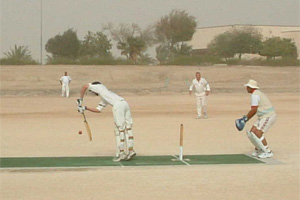  MEMORIAL CRICKET GAME IN BAHRAIN
- EULOGY TO PAUL MORAN - By Charles Haine, March 2003 MEMORIAL CRICKET GAME IN BAHRAIN
- EULOGY TO PAUL MORAN - By Charles Haine, March 2003
-
- At 1pm On Thursday 27 March,
the players and members of Awali Cricket Club in the Kingdom
of Bahrain convened at the Awali Oval to play a memorial game
for our great friend Paul Moran. Such was the turnout for this
popular man that we played 13-a-side (teams pictured, left) and
there was a fine crowd watching the proceedings. Each player
wore a black armband and a minutes silence was observed at the
square. After the game approximately 50 members and friends packed
the small clubhouse for food, a few beers and to share stories
about Paul. Club President Alan Law made a short formal speech
about Paul's significant contribution to the club. Guy Parker
read aloud a fitting tribute by Canberra-based former club captain
and friend Andy Dunn. The present club captain, Mark Seaman,
had asked Paul's team-mate and good friend Charles Haine (pictured
below) to give a eulogy, which was intended to be light-hearted
and celebratory speech. A transcript of the speech follows. I
have explained a few points in italics.
-
"I have been asked to give
a eulogy in honor of, and celebrate our experiences and memories
of Paul's life whilst at the same time, tell a story or two about
the man who was to all of us, a great friend. I am going to talk
about Paul's different qualities and interests, in turn, and
share a few examples of our short time with him.
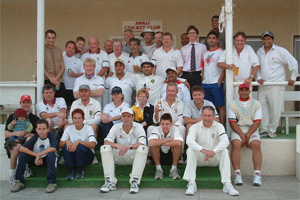 Paul's
interest in journalism was an inherent part of his life and testament
to his interest in people. His infectious enthusiasm, calm manner
and attention to detail was noted by all. He had a mature attitude
and never seemed to get angry, I cannot even remember a single
instance when he did. Under club rules on a Thursday, however,
this would be an immediate fine of 'temper avoidance! ' Harry,
fill the jug ! His love of the Middle East was well-known and
a good example was his dedication in study of the Kurds. He lent
me a thick hard-backed book on the Kurds, signed by the author
and offered it for borrowing. I have to say it did not make it
straight to the top of my pile of reading material but do you
know what? I didn't really have to read it because Paul relayed
many of the stories contained within. He had a rare interest
in history and people and you will all have your own accounts
of this. Paul had an amazing knowledge of the Middle East but
I have a few updates for him now, which have just been newsflashed
: - Apparently, the outbreak of foot and mouth disease in the
UK last year has been directly attributed to Osama bin Laden
it was Is-lamb ! - And, Tariq Aziz, the Iraqi foreign minister
has today changed his name by deed poll to Tariq Az-was
! Paul's
interest in journalism was an inherent part of his life and testament
to his interest in people. His infectious enthusiasm, calm manner
and attention to detail was noted by all. He had a mature attitude
and never seemed to get angry, I cannot even remember a single
instance when he did. Under club rules on a Thursday, however,
this would be an immediate fine of 'temper avoidance! ' Harry,
fill the jug ! His love of the Middle East was well-known and
a good example was his dedication in study of the Kurds. He lent
me a thick hard-backed book on the Kurds, signed by the author
and offered it for borrowing. I have to say it did not make it
straight to the top of my pile of reading material but do you
know what? I didn't really have to read it because Paul relayed
many of the stories contained within. He had a rare interest
in history and people and you will all have your own accounts
of this. Paul had an amazing knowledge of the Middle East but
I have a few updates for him now, which have just been newsflashed
: - Apparently, the outbreak of foot and mouth disease in the
UK last year has been directly attributed to Osama bin Laden
it was Is-lamb ! - And, Tariq Aziz, the Iraqi foreign minister
has today changed his name by deed poll to Tariq Az-was
!
-
- Paul loved documentaries and
left many videos at my house including a hilarious one about
the hapless Greek football team attending the 1994 World Cup
in the States. There were also many of the Australian cricket
team through the ages. He was an avid movie-goer and I went to
see Black Hawk Down with Paul and Ivana. Afterwards, he explained
the ins and outs of American foreign policy in Africa and the
acts of terrorism in Mogadishu, all of which was an incredible
learning experience. His fascination with people took him on
a quest for adventure and let's takes an example from cricket
on a Thursday and Friday [the weekend in the Middle East].
One would typically arrive at the club and take an immediate
look around to quickly ascertain who was on the teamsheet, in
other words, who your fellow 'droppers' for the day would be.
You would assess their reasons for presence or absence with great
interest.
-
- Where's Tyrone ? attending a
random interview with an Embassy officer to emigrate from Bahrain,
would come the reply
Where's Khizza ? away making an interesting home movie in Karachi
Where's Turner ? oh, he's away on his fifth cricket tour of the
season, in Doha
Where's Deano ? he's fed up with muppet cricket and is walking
the dog
Where's Dabir ? the King of Pink didn't like the look of the
opposition this week; alternatively, he didn't quite approve
of batting at No.7 last week
Charlie ? remember the game has not started yet, he'll be on
the Sitra Causeway at the moment
Guy Parker ? in the dunny, taking a forest
Ranga ? working !
-
- But when it came to Paul, you
would listen with amazement : Last night he snuck out in fatigues,
took a helicopter from Mina Sulman onto an American aircraft
carrier in the northern Arabian Gulf and is going into Iraqi
territorial waters to report and film the interception of weapons
of mass destruction alongside marines for national Australian
television ! WHAT ARE WE DOING WITH OUR LIVES ? Paul certainly
led an exciting life and made us think about what we were not
doing.
 I want to talk about Paul's interest I people.
By the way, Paul hated places like the Warbler and the Brit Club
bar where he witnessed what he called 'the sad' people. One evening
he took me and my friend Rog the Dodge who was visiting
from London on an impromtu souk crawl. You should have
seen the two of us quiet English lads from the Cotswold
of course entering the Sahara Hotel by the bus station.
Every window in the first two storeys are concreted up and the
packed inside was like a scene from the nefarious underworld
of Bulawayo. I want to talk about Paul's interest I people.
By the way, Paul hated places like the Warbler and the Brit Club
bar where he witnessed what he called 'the sad' people. One evening
he took me and my friend Rog the Dodge who was visiting
from London on an impromtu souk crawl. You should have
seen the two of us quiet English lads from the Cotswold
of course entering the Sahara Hotel by the bus station.
Every window in the first two storeys are concreted up and the
packed inside was like a scene from the nefarious underworld
of Bulawayo.
We sat at a plastic picnic table in the corner amongst what could
only be fairly described as a bevvy of robust Somali girls of
the night. All hell was about to break loose around the pool
table and if Huggy Bear had walked in, it would not have looked
out of place. Rog and I bolted down a quick beer whilst taking
on board the advice of [ex-SAS soldier] Andy McNab
in such situations scouting for our nearest escape route
!
We watched with disbelief as another two Asian construction workers
in boiler suits bartered down a girl from five dinars and disappear
up the stairs and as Rog and I got up to leave hastily, Paul
shouts to the bar 'Three more Buds mate!'. 'This is real life
lads' Paul said enthusiastically, 'this is where the poor working
classes go for entertainment, this is where the real Bahrain
is, I wish I had my video camera ! We ordered Rog his first shisha
hubba-bubba pipe at the next venue before adjourning to that
hotel with the 17th floor overhead walkway to watch the Filipino
singing Elvis until the end of the night. Knowing Paul when he
was in moods like this was an eclectic and horizon-widening experience.
-
I want to mention Paul's humanitarian
and philanthropic nature. He was a great dispenser of advice
and knowledge and, during cricket, a mentor to the AYP
the Awali Youth Programme [this is only James McCallum].
He would go out of his way to encourage, suggest, help and assist.
I can recall him standing with Dunny behind the cricket nets
at the Rugby Club doing just that. His last trip to Bahrain,
in January, was investigating a satellite link-up between an
American and Bahraini school so that students would have the
opportunity to discuss tensions between the superpower and Gulf
States.
His famous cricket tour video diary of RIPE-ON [Ripon],
Yorkshire, England last summer is another example that will stay
with us forever. Seriously, Paul must have spent over 200 hours
of his own time making that amazing video. During filming, he
was like Scorsese I recall very vividly standing outside
Ripon Cathedral at 8am on a rainy Tuesday morning with Paul enthusing:
'Come on Charlie, feel the vibe man, let the words just flow,
thinkAmerican Golf presenter on Fox Sports saying 'Hi, I'm Chuck
Chippendale the Third''. Inquisitive old dears would approach
us and Paul would respond 'Hi, we're from the BBC ! ". Like
the Dunny leaving video, which was entirely Paul's idea from
start to finish, filming is quite stressful but a superb experience.
Towards his family, these qualities shone through. In late 2002
and early 2003 Paul took on a multitude of life-changing activities
in a short period of time: moving out of Bahrain, Ivana starting
a new course in Paris, finding and moving into a new apartment
in Paris, a trip to Kuwait for workall in about two months. Deano
summed it up nicely : " The guy's a legend ! "
|
- Cricketing Exploits and
Sport
|
Paul liked to play tennis. He was
the type of player who could invoke a desire to instantly retire
from a sport. I played him at the Brit Club in stifling and humid
conditions one night. I considered myself to be a fairly decent
player and proceeded to employ almighty power in serving, tenacious
volleys and generally trying to smack the ball as hard as physically
possible. Paul stayed relaxed at the back of the court returning
every shot with glee, double interest and with half the power
and treble the spin. He won six-love with consummate ease.
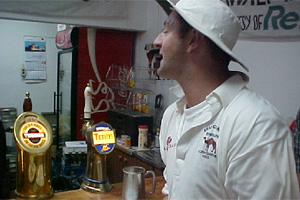 Now we have
to talk about cricket. I do not want to talk about Paul's textbook
forward defensive, his smile whenever Tyrone called out 'Deana'
instead of Deano, the trusty Vampire bat and climbing over the
fence at the Rugby Club for nets to avoid paying the one dinar
entrance fee ! So instead, I'm going to talk about his style
on the pitch. Who can forget PM's disdain of contemporary Pakistani
tailoring like those draw-string waisted, polyester, thick creased
cream slacks! No! Paul wore 1950's Egyptian cotton cricket trousers
in white, with internal rubber liners for grips, proper pleats
the thing is, he had probably actually had them since the
50's. Now we have
to talk about cricket. I do not want to talk about Paul's textbook
forward defensive, his smile whenever Tyrone called out 'Deana'
instead of Deano, the trusty Vampire bat and climbing over the
fence at the Rugby Club for nets to avoid paying the one dinar
entrance fee ! So instead, I'm going to talk about his style
on the pitch. Who can forget PM's disdain of contemporary Pakistani
tailoring like those draw-string waisted, polyester, thick creased
cream slacks! No! Paul wore 1950's Egyptian cotton cricket trousers
in white, with internal rubber liners for grips, proper pleats
the thing is, he had probably actually had them since the
50's.
-
- Every week he would put a new
hole in them, usually at the knee. He must have had six granny's
just to do the required darning to take the job on! He frequently
took the trousers into the souk on a Saturday for repair. The
same was true of his trademark Victoria and Albert shirt he always
wore to bat. He was a great giver on the pitch. Those Australian
genes definitely had some English spirit in them though, because
I'm thinking of the old cricket addage that states: 'Its easy
to get a pint off a Yorkshireman cricketer, but only of blood.
-
- Paul frequently spilt that on
the pitch such was his commitment to each game. No one can forget
the black eyes he sustained keeping wicket each attained
on consecutive weeks. And on last year's tour, I remember opening
the bowling at the first game at Rainton with Paul behind the
stumps. The first delivery flew three yards wide, Paul unable
to stop four byes despite diving full length. The next ball was
an exact repeat but rather than drawing disdain from the kepper,
I gained nothing but unerring encouragement from Paul. After
the third wide of the over he shouted out: 'Come one Charlie,
you've got him now!'. Brilliant.
-
- At the last game of cricket
he played in [Friday 24 January 2003], Paul was late (alarm
clock management problems). Anyway, he stepped onto the pitch
in about the fifth over but within two, the Victorian slacks
were split open, blood dripping down his shin. I'm so glad he
took part in that last gasp/ball victory over Khan CC that was
followed by a barbeque and the premiere screening of his superb
tour video. He certainly loved cricket. As Adam said of Sunday's
Australian victory over the Injuns in the cricket World Cup final
this week he probably had the best seat in the house !
I was not there but had a recount from Spunky and Guy about one
of Paul's prolific performances. It was during a Thursday afternoon
game where PM threw down the wicket-keeping mitts to bowl an
over against a visiting British navy team. The first ball of
that unique brand of spin bagged a wicket! The second ball, another
wicket!! Paul surely had the opportunity to create personal hat-trick
history. At this point a Scottish gentleman appeared at the crease
brandishing the Monty bat like a golf club and spoutin': 'Hew
the hell dae ye held this fookin' wood thing ? The bails went
flying!!. The rest of the over was dot ball, wicket, wicket.
That's a five for nothing in one over!! Captain Keith Veryard
was heard to mutter: 'Thank you, take a rest Paul!'. Paul came
back to the apartment in full story-telling mode with very little
blood left in his alcohol system!
Karen and I were lucky enough to
spend a last evening with Paul to say goodbye before his return
to an expectant Ivana. Before dining, Paul sat us down in front
of a documentary about the Aussie test cricket team of the 80's
and their reaction to the change of captaincy and series against
the Poms in 1985. He liked to rewind the interview with Denis
Lillee and his thoughts on the ability of Kim Hughes. He also
relayed the story of the Nairn Brothers, again. These were infamous
kiwi's who started the first taxi service in Damascus after the
First World War. I know he told the story to Hamish and I had
heard it many times. Paul had been there in Syria, photographed
the actual coaches they had used and tracked down original documents
and people associated with their business. He had an amazing
personal interest in feats of achievement. That evening, he picked
up my monster water pistol, which shoots 30m and from the balcony
in Adliya was showing us how the Washington sniper would take
out people. He kept spraying passing Americans and then hiding
behind the wall, innocently but hilariously, like a mischievous
kiddie playing.
As Paul assembled his 60 kilograms of baggage comprising video
kit, laptops and sports luggage, he unfurled a perfectly pressed
blue blazer, chinos and black shoes. I gave him some good ribbing
about that but he said such fashion was essential for travelling.
His travel agent contact had promised him that her friend would
be on the check-in desk and that excess baggage would not be
an issue. Of course, the lady was not working that night and
Gulf Air demanded $100 for every 10kgs over the 20kg limit. It
took Paul one hour of negotiation to resolve the situation. The
result: he got all his bags on for free and obtained an upgrade
to business class!! That was Paul. He later claimed, by email,
that it was the blue blazer that swung it !
-
|
- Celebration, Thanks &
Toast
|
We may have known PM for only two
years but he had an unprecedented impact on people. It is a rare
breed of person who has the ability to transform a dinner party
and engage anyone, from any background, in interesting conversation.
We often see and talk to a wide variety of characters in the
clubhouse after a game of cricket. It is the type of place that
attracts short-term visitors, military men, mutants, bizarre
Englishmen and noisy Aussies! It is not until now that reading
the glowing tributes of family members and international journalists
that it has hit us how well respected, well travelled and well-known
PM was. In a relatively short space of time, he gained notoriety
by having his own catchphrases at the club :
-
- 'PM for PM' we have Dunny
to blame for that one "A Paul Moran Glass" a
vase-like receptacle for a post-game drink, which seemed the
only way in which a pint of Amstel Lite could redeem itself to
Paul. And also statements while watching the opposition bat,
like "Hey, that bloke hit it and is not walking!'. 'Hang
on, PM never walks ! ". Maybe not just Paul, perhaps this
is a genetic fault with Australian cricketers ! Seriously, the
manner of his death shows a great deal about the type of decent
bloke he was putting himself in the middle of it all to
try and find out and report the truth. As this is a eulogy, I
have to finish on a humorous note. We will remember : His power
walk the man literally zoomed along ! The fact that PM
was once Humphrey B. Bear (that's the Australian equivalent to
Bungal from Rainbow for the Brits) obviously a natural
with children; The pleasure of going on cricket tour with him
waiting up all night until 3am in the Drowned Rat pub for
Betty's promised early morning platter of culinary delights
only for it not to arrive but then watch Paul break in
to the B&B's kitchen, acquire a pack of unidentified snacks,
munch half a blueberry muffin, return to his room, and place
several of them on a sleeping Guy Parker's bottom! So let's add
excessive bravery to Paul's qualities; and The mentioning of
Sir Donald Bradman at least once per week in the clubhouse. But
most of all, we have lost a fantastic bloke, a great batsman
and all-round cricket player and an extremely good friend of
ours. Please can we raise our glasses twice : To his courageous
wife Ivana and little baby Tara Alexandra and their safety and
progress over the coming years. Secondly, to celebrate knowing
Paul, our friend."
-
-
 RORY
PECK AWARDS CEREMONY - By Allison Havey, October 2003 RORY
PECK AWARDS CEREMONY - By Allison Havey, October 2003
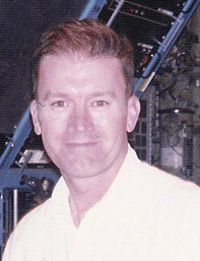 Australian freelance cameraman
Paul Moran was killed by a car bomb in Khumal, northeastern Iraq
on march 22 while on assignment for ABC Australia. Earlier that
morning, the United States had fired cruise missiles on an area
believed to be a base for the militant group Ansar al-Islam.
Ansar al-Islam is said to be linked to Al-Qaeda. Paul knew the
terrain, having covered the story for over a decade. Neither
Paul nor his correspondent Eric Campbell wanted to take any chances
and they believed the outskirts were now secured by the Kurds.
They documented the refugees leaving the area. As he filmed his
last short, a suicide bomber drove up behind him and set off
a powerful explosion. Paul never knew what hit him. Before setting
out that day, Paul had told ABC's international editor that he
felt great and was having the time of his life. But he had not
been there since Sepetmber 11, and his death is tangible evidence
that the world landscape truly has changed. Australian freelance cameraman
Paul Moran was killed by a car bomb in Khumal, northeastern Iraq
on march 22 while on assignment for ABC Australia. Earlier that
morning, the United States had fired cruise missiles on an area
believed to be a base for the militant group Ansar al-Islam.
Ansar al-Islam is said to be linked to Al-Qaeda. Paul knew the
terrain, having covered the story for over a decade. Neither
Paul nor his correspondent Eric Campbell wanted to take any chances
and they believed the outskirts were now secured by the Kurds.
They documented the refugees leaving the area. As he filmed his
last short, a suicide bomber drove up behind him and set off
a powerful explosion. Paul never knew what hit him. Before setting
out that day, Paul had told ABC's international editor that he
felt great and was having the time of his life. But he had not
been there since Sepetmber 11, and his death is tangible evidence
that the world landscape truly has changed.
-
- At 39, Paul was at his peak.
He had secured world exclusives, including a TV interview with
an Iraqi defector which sold worldwide. Be it terrified asylum
seekers who washed ashore in Cyprus or the walking wounded of
war zones, Paul always gave voice to the underdog. He had tremendous
energy and spirit and was always positive about any situation.
He told wonderful stories, When his father was terminally ill,
not too long ago, he did whatever he could to help comfort him.
I really admired his courage. I think most of us who knew Paul
would agree that he was extremely compassionate, funny and resourceful.
That was Paul. He taught us a great deal. Paul was many men,
but the man I last saw packing his gear into a taxi was a very
happy husband and a proud father. Smiling broadly, he thrust
a photo of his beautiful family towards me and waved goodbye.
-
|
- Chapter from Rory Peck Annual
Awards brochure - by Ivana Rapajic-Moran
|
- Paul Moran was a highly professional,
resourceful and brave journalist. As a freelancer, he worked
for several international broadcasters and news agencies during
an almost two decade-long career which started in Adelaide, Australia,
his home town, and ended in distant Iraq just before his fortieth
birthday. There was an irresistible energy which surrounded Paul
Moran. He exuded happiness and it was contagious. Time spent
with Paul was a wonderful mix of laughter and intensity. People
might forget many details later on in life, but they will surely
never forget how Paul made them feel.
Paul was passionate about people, photography, politics and travel.
His work was issue-based: the stories he told were purposeful.
His professional expertise drew on his extensive experience in
the Middle East. Refugee rights and the victims of war were both
particularly consuming issues for Paul. He was relentless in
his commitment to a story. His beautiful photographs witness
the precious moments he lived. During his travels around the
world, Paul wove a wide web of friends from all walks of life.
He adored connecting various people he knew and watching sparks
fly. Invariably, they bonded, for they were all already infected
with Paul's warmth. Perhaps his proudest moment in life was the
birth of his daughter Tara, who came into this world just six
weeks before Paul's untimely death. Paul has left his "mini-me",
as he would affectionately call her, with an inspirational and
adventurous legacy.
-
-
 MEMORIAL
SERVICE FOR JOURNALISTS - ST. BRIDES CHURCH, FLEET STREET, LONDON
- By Francis Collins, October 2003 MEMORIAL
SERVICE FOR JOURNALISTS - ST. BRIDES CHURCH, FLEET STREET, LONDON
- By Francis Collins, October 2003
-
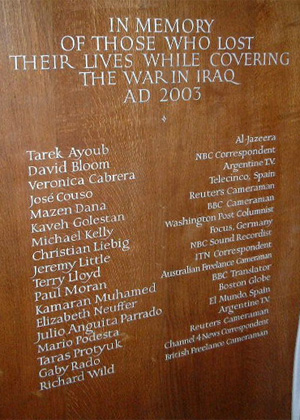 St
Brides Church, October 08, 2003, by Francis Collins St
Brides Church, October 08, 2003, by Francis Collins
-
- For those of us moved by knowing
Paul well, and so affected by his early passing, 2003 was obviously
a year tinged with great sadness. And while I'm sure many of
us had thoughts for other families and friends who had lost loved
ones in the conflict, the sadness felt at the loss of Paul was
a personal one.
-
- For that reason it was good
to be at St Brides Church, London, last October for a memorial
for all journalists and cameramen who had lost their lives. A
chance to be with others, many of whom knew and respected Paul,
but plenty who didn't and yet had feelings common to all of us.
-
- An appropriate venue too, St
Bride's was where Wynkyn de Worde set up the first printing press
in the City of London. And it's position, just off Fleet street
(the home of British journalism for so long) has made it the
traditional venue for memorials to departed journalists.
-
- For years, wall plaques have
remembered Fleet Street journalists and printers. They now also
commemorate journalists of the modern media, our friend Paul
Moran among them. The Canon of the church, David Meara church
conducted a magnificent service, with a blend of music, specially
commissioned videos and eadings.
- Sir Trevor McDonald of ITN news
in London unveiled a memorial on the wall to the 18 who had lost
their lives covering the war.
-
- There were readings by Lord
Rothermere, Anthony Lloyd of the Times of London while John Simpson
of the BBC gave a passionate speech about the increased dangers
that were being faced by members of his profession, including
some harsh words about so called 'friendly fire'. He himself
so very nearly a victim of an American bomb, not long after we
lost Paul. His translator Kamaran Abdurrazaq Mohammed and 18
others died that day. But he made the chilling point that he'd
attended far too many memorial services of this kind in recent
years.
-
- It was of course a sad occasion,
but there was also the feeling of optimism in that the lives
of Paul, and other brave journalists had been recognized, their
work acknowledged, and in a small way they lived on through such
recognition and appreciation.
-
- But this was, after all, a service
where our thoughts were mainly of Paul. So after attending the
service, placing candles for Tara and Ivana, Charles Haine and
I did what Paul would have done under similar circumstances.
We headed to the nearest of the Fleet streets traditional pubs
to drink beer .and exchange Moran tales
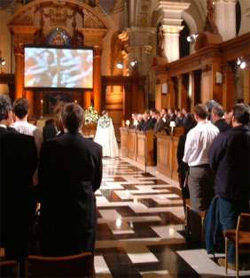  MEMORIAL SERVICE FOR JOURNALISTS
- ST. BRIDES CHURCH, FLEET STREET, LONDON MEMORIAL SERVICE FOR JOURNALISTS
- ST. BRIDES CHURCH, FLEET STREET, LONDON
-
- Prayer for Journalists -
April 28, 2003
- The tranquil north aisle of
a world-famous Christian church in the heart of London has taken
on an even more special meaning these past few weeks. Because
here is housed the journalists' altar, where not a day passes
without prayers being said for the safety of all those journalists
and cameramen whose responsibility is to report news from around
the world, particularly at this time from Iraq.
St Bride's Church in Fleet Street is one of the great churches
built by Christopher Wren. It rose from the ashes during another
famous conflict, the Second World War. London newspapers may
have left Fleet Street, but the industry today is still known
by that name and many journalists often refer to St Bride's as
the 'street's cathedral.' Reporting events in worn-torn countries
is a hazardous duty and, sadly, the list of names of all those
whose lives have been taken in the conflict, has grown these
past few weeks. Here are those names:
-
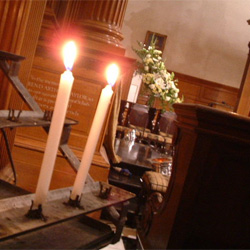  Terry
Lloyd, ITN correspondent Terry
Lloyd, ITN correspondent
 Gaby Rado,
Channel 4 News correspondent Gaby Rado,
Channel 4 News correspondent
 Paul Moran,
freelance Australian cameraman Paul Moran,
freelance Australian cameraman
 Kaveh Golestan,
freelance BBC cameraman Kaveh Golestan,
freelance BBC cameraman
 Michael Kelly,
Washington Post columnist Michael Kelly,
Washington Post columnist
 Kamaran Muhamed,
BBC translator Kamaran Muhamed,
BBC translator
 David Bloom,
NBC correspondent David Bloom,
NBC correspondent
 Taras Protsyuk,
Reuters cameraman Taras Protsyuk,
Reuters cameraman
 Jose Couso,
Telecinco, Spain Jose Couso,
Telecinco, Spain
 Tareq Ayoub,
Al-Jazeera Tareq Ayoub,
Al-Jazeera
 Christian Liebig,
Focus, Germany Christian Liebig,
Focus, Germany
 Julio Anguita
Parrado, El Mundo, Spain Julio Anguita
Parrado, El Mundo, Spain
-
- Below these names is a simple
message that reads : At this altar day by day, we pray for
all those who face danger, persecution and death in bringing
the truth in word and pictures to a trouble world.
-
- And finally, here is a prayer
for journalists:
Almighty God, strengthen and direct, we pray, the will of
all whose work it is to write what many read, and to speak where
many listen. May we be bold to confront evil and injustice: understanding
and compassionate of human weakness; rejecting alike the half-truth
which deceives, and the slanted word which corrupts. May the
power which is ours, for good or ill, always be used with honesty
and courage, with respect and integrity, so that when all here
has been written, said and done, we may, unashamed, meet Thee
face to face. Amen.
-
 AUSTRALIAN STORY - ABC Broadcast,
October 2003 AUSTRALIAN STORY - ABC Broadcast,
October 2003
 MELBOURNE PRESS CLUB AWARDS 2003
- By Verity Moran, March 2004 MELBOURNE PRESS CLUB AWARDS 2003
- By Verity Moran, March 2004
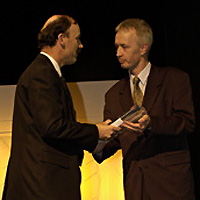 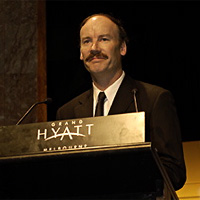 Tonight, at the Quills dinner
of the Melbourne Press Club, Paul Moran was awarded the 2003
Grant Hattam Award. It honours the person who during the year
makes the greatest contribution to journalism or press freedom
through courage and determination against the odds, characteristics
shown by the man whose memory it pays tribute to.' The award
was accepted by Paul's brother, Tim Moran, of Adelaide. Paul
was killed by trying to get that 'extra shot'. Tonight, at the Quills dinner
of the Melbourne Press Club, Paul Moran was awarded the 2003
Grant Hattam Award. It honours the person who during the year
makes the greatest contribution to journalism or press freedom
through courage and determination against the odds, characteristics
shown by the man whose memory it pays tribute to.' The award
was accepted by Paul's brother, Tim Moran, of Adelaide. Paul
was killed by trying to get that 'extra shot'.
-
- Paul's God daughter Verity's
letter to Paul's wife Ivana : "The night was very successful
and enjoyable. We arrived at the very exclusive Hyatt at 7:00
for pre-dinner drinks and the awards were presented at 7:30.
Finally after a long awaited time the Grant Hattam award was
announced. We found out some information about Grant Hattam that
we thought you would like to know: "The award is presented
annually to the person who makes the greatest contribution to
Journalism or press freedom through courage and determination
against the odds. The characteristics of the man whose memory
it honors. Grant Hattam was in the legal profession. He died
in 1998 after a courageous battle with cancer. Grant was principle
legal advisor to a number of major media organizations. He was
a loyal defender of the media, a tenacious fighter for media
freedom and someone who believed passionately in the importance
of the story being told.The MC Virginia Trioli spoke thoughtful
words about Paul and Jeremy Little the other cameraman. A slideshow
with the pictures Ivana sent of Paul were then shown. Grant Hattams
son presented the award to dad who made a short speech. The journalists
were very respectful of Paul and a few approached us with kind
words.I hope this gives you a small insight into the night which
we were very honored to go to."
-
-
 NATIONAL
PUBLIC RADIO WAR DIARES - By Lynn McConaughey, March 2003 NATIONAL
PUBLIC RADIO WAR DIARES - By Lynn McConaughey, March 2003
-
- MARCH 27, 2003 · Paul
Moran was an Australian cameraman who was killed by a suicide
car bomb at a Kurdish military checkpoint in northern Iraq last
week. Moran, who was 39, had several years of experience covering
the news in the Middle East, beginning with the 1991 Gulf War.
Over the years he continued to document the lives of the Iraqi
people. Here's a War Diary from his close friend, Lynn McConaughey
of Washington, D.C. On Friday, she leaves for Adelaide, Australia,
Moran's hometown, to attend his memorial service.
-
- "A good friend of mine
was killed in Iraq last week. He brought back wonderful stories
and photos of the people he met -- of just experiencing a Kurdish
wedding one day and how beautiful the mountains were. And when
current events came to a head these past few months, there was
really no question that he would go, even though he has a wife
and a seven-week-old baby.
He was a vibrant, positive personality who captivated everyone
he knew and I don't think there was anybody in the world that
he didn't like. He was able to find something positive about
everybody and let them know it. We always thought he would be
OK and there have been a lot of people around the world who are
broken-hearted right now. And I think I always expected to be
hearing the news from him, not hearing news about him."
-
 WASHINGTON, D.C. MEMORIAL
- By May Roustom, March 2003 WASHINGTON, D.C. MEMORIAL
- By May Roustom, March 2003
-
- On March 24, 2003 the friends
and colleagues of Paul Moran gathered in Washington, D.C. to
seek comfort in one another's company and ease the shock of the
news
of his death only two days earlier. Paul's untimely and tragic
death had barely sunk in for most of us when we came together
at Jury's Pub on Dupont Circle in the centre of the city. Always
prepared in a crisis, John Rendon had the ware withal to organize
the
memorial gathering for Paul while the rest of us were only just
beginning to understand that this man we all loved so much was
gone.
- As we gathered that Monday evening
the hard reality of the news began sinking in when friends and
colleagues who had long ago left Washington walked into the pub,
just off the plane from places near and far. This was no ordinary
gathering, but it was a matter of course that Paul could draw
people together effortlessly even when he wasn't physically there.
- The most repeated phrase that
night was "it feels like Paul should be the next person
through those doors." It certainly did. We wanted him there
very badly. But it could not be. Instead we slowly began to share
out fondest memories of Paul.
- We remembered our friend with
a great love for life who could go anywhere around the world
and get along with anyone at all. We remembered how he always
made us laugh and never once was caught frowning, except in gest.
We remembered the Australian accent that we Americans found so
charming. And of course we all dwelt on his wonderful sense of
humour and the different adventures we all at one time or another
shared with him.
- It was hard not to express our
admiration for a man who did so much more in 39 years than most
of us dare do in a lifetime. We also recalled Paul's professionalism
and skill, combined with his innate sense of what is right. Many
of us had worked with him
and never knew him to shrink from a challenge or to stop working
for any reason before the job was done right. But he always made
it fun. Whether it was 2 AM in an editing room in a foreign land,
or out on a shoot in the desert, it was always good to work with
Paul, and it really was always fun.
- After many a shared story, photographs,
letters and a group toast to Paul's memory, we prepared to leave
reluctantly. Saying goodbye to our brilliant and loving friend
and colleague was easier in a group than alone. Many of us felt
blessed to have crossed paths
with Paul and walked with him a small part of the way.
Having done so however, we will always be able to admire the
example he set, taking every opportunity to live his the way
he wanted, yet honestly and generously.
 ROTARIANS BRING A BREATH OF COMPASSION
TO BAGHDAD - By Liz Gooch, September 2004 ROTARIANS BRING A BREATH OF COMPASSION
TO BAGHDAD - By Liz Gooch, September 2004
-
- When John Robson read a newspaper
article about women in Iraq giving birth to premature babies
because of the tense living conditions, he thought there was
something his local Rotary Club could do to help. After seven
months of planning, an incubator was delivered to al-Yarmouk
Hospital in Baghdad this week, with the help of a German medical
company. A premature baby has already been put in the incubator,
which was paid for by Rotary clubs around Victoria and dedicated
to ABC cameraman Paul Moran, who was killed in northern Iraq
last year. "We're thinking of the ordinary people that are
trying to get on with their lives and we just wanted to help
them," said Mr Robson, of the North Balwyn Rotary Club.
"What better place than with their children, to show them
that we do care?"
-
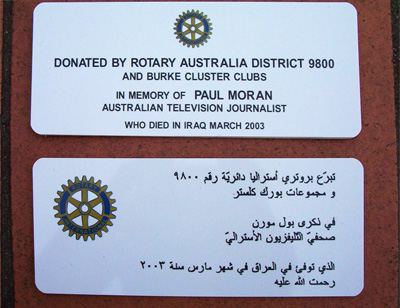
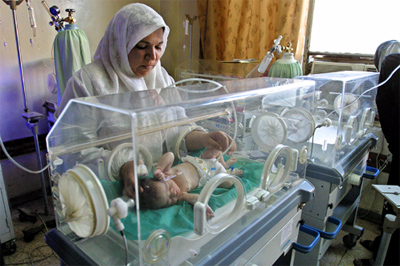
-
- The incubator cost $13,000,
with 50 per cent of the funds coming from Rotary district 9800,
which covers parts of Melbourne and central Victoria. Proceeds
from a concert by the Youth Orchestra from Long Island, New York,
which the North Balwyn club hosted when it visited Melbourne,
were also donated to the project. The rest of the funding came
from North Balwyn, Camberwell, North Camberwell and Canterbury
Rotary clubs. Mr Robson contacted German medical company Draeger
Medical, which agreed to deliver and install the incubator, with
a 35 per cent discount.
-
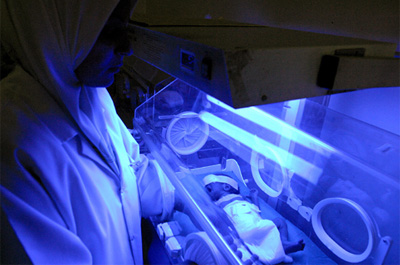
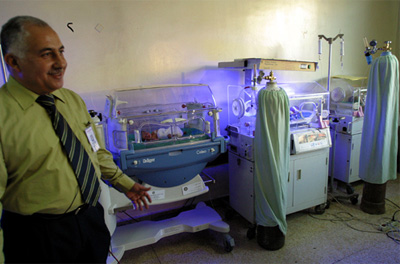
-
- It was another newspaper article
that prompted Mr Robson to suggest dedicating the incubator to
Moran, who had an eight-week-old daughter. Mr Robson contacted
the cameraman's widow, Ivana Moran, in Paris and told her of
his plan. "She jumped at it. She was absolutely over the
moon," he said. He had hoped officials from the Australian
embassy in Baghdad would be at the presentation on Monday, but
security concerns meant they could not attend. Dr Haidar al-Safar,
from al-Yarmouk Hospital, told Mr Robson this week that the incubator
had been put to use immediately. "They're tickled pink over
there," Mr Robson said. "He thanked me profusely."
Photos: Curtesy of AFP (photographer Sabah Arar)
-
-
-
 THROUGH
AUSTRALIAN EYES ABC FOREIGN CORRESPONDENT EXHIBITION AT ABC HQ
IN SYDNEY - May 2004 THROUGH
AUSTRALIAN EYES ABC FOREIGN CORRESPONDENT EXHIBITION AT ABC HQ
IN SYDNEY - May 2004
-
- "Our overseas reporters
today are like information commandos, covering all manner of
subjects, for so many different outlets and for so many deadlines.
A case of so few delivering so much.and in the case of a man
from Glengowrie, Paul Moran, giving his life." - from the
speech by John Tulloh, opening of the exhibition in Adelaide
21.05.2004.
-
-
 THE FREEDOM FORUM JOURNALISTS
MEMORIAL - Washington DC, May 2004 THE FREEDOM FORUM JOURNALISTS
MEMORIAL - Washington DC, May 2004
-
 WAKE AT ADELAIDE SACRED HEART
OVAL - By Andrew Porteous, April 2003 WAKE AT ADELAIDE SACRED HEART
OVAL - By Andrew Porteous, April 2003
-
- Well over 500 people attended
the traditional Catholic Mass held at Our Lady of Victories Church
at Glenelg, to commemorate and celebrate the life of Paul Moran.
As well as Paul's family, friends and colleagues, many of whom
travelled from interstate and overseas to pay their respects,
the congregation included South Australia's Premier, Mike Rann,
former deputy prime minister, Tim Fischer, as well as representatives
of the Prime Minister of Kurdistan.
The eulogies served to remind us, with great stories and memories
of Paul's life, of his achievements and the many, many things
we loved and admired about him.
Paul was buried at Brighton North Cemetery, near his father Gerald.
Afterwards, a traditional Irish-style wake was held at the Sacred
Heart College Oval, the scene of a number of Paul's sporting
triumphs and one of his favourite places. It was an affair that
Paul would have loved, with many rich stories, plenty of laughter
and plenty of drinks being shared by all.
The tributes and memories continued late into the night at the
Glenelg Football Club, the home of Paul's beloved Bay Tigers.
I'm positive that Paul was looking down on us, 'over the moon'
that he had managed to get so many of his family and friends,
from all parts of the globe, together in one place his
home town of Adelaide!
-
 GALA DINNER AT GLENELG FOOTBALL
CLUB - By Robert Buchan, July 2003 GALA DINNER AT GLENELG FOOTBALL
CLUB - By Robert Buchan, July 2003
-
-
- For One Night Only.
-
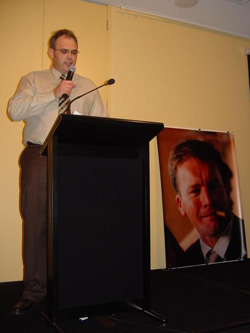 Thirty
years after the famous 1973 grand final win, two celebrations
were held at the Club. Both functions brought together old friends
and competitors, where fading memories were debated, where there
was tears of laughter and sorrow, where people from all walks
of life mixed easily because of a common shared experience. One
was a thirty-year commemorative dinner for the football club's
greatest day; the other was a memorial dinner for Paul Moran.
He would have appreciated the connection. Thirty
years after the famous 1973 grand final win, two celebrations
were held at the Club. Both functions brought together old friends
and competitors, where fading memories were debated, where there
was tears of laughter and sorrow, where people from all walks
of life mixed easily because of a common shared experience. One
was a thirty-year commemorative dinner for the football club's
greatest day; the other was a memorial dinner for Paul Moran.
He would have appreciated the connection.
-
 When
Paul's' friends and family first learned he had died in a country
so foreign and violent, there was a feeling of stunned helplessness.
A core group including Paul's brothers Gerry, Greg and Tim, his
cousins Andrew Killey and Neville Quist and his friends Andrew
Porteous, Rob Buchan and Bob Singh decided that whilst they could
not change the past, they could influence the future. They decided
to establish a trust fund for Tara and Ivana that would in a
small way, make the circumstances of their new life a little
easier. When
Paul's' friends and family first learned he had died in a country
so foreign and violent, there was a feeling of stunned helplessness.
A core group including Paul's brothers Gerry, Greg and Tim, his
cousins Andrew Killey and Neville Quist and his friends Andrew
Porteous, Rob Buchan and Bob Singh decided that whilst they could
not change the past, they could influence the future. They decided
to establish a trust fund for Tara and Ivana that would in a
small way, make the circumstances of their new life a little
easier.
-
- So the Paul Moran Memorial Trust
was created in Andrew Killey's office. Ably assisted by Andrew's
assistant, Jo Healey (who actually did the work) eight people
with a mission and a thirst for complimentary Coopers Ale met
to plan the Paul Moran Memorial Dinner.
-
- Initially, the group considered
an all star, gala event. With the contacts around the table,
Adelaide's beautiful people were one press away on the speed
dial. But that was not Paul. Air kissing over sushi and discussing
which chalet for the snow could potentially raise more money,
but it would not be a celebration of Paul's life. The group decided
to go back to basics. The Glenelg Footy club, a 'chicken or the
beef' menu and all the Coopers Ale they could get hold of.
- The date Friday, 27th of June
2003 was set, the club function hall booked, the beer and wine
organised and the invitations sent. No problem....well except
for the problem of what to do with over 100 people in a room
for four hours? The Moran family, like any Irish clan worth its
Guiness has a deep well of human experience and talent to draw
from. So that seemed the most logical place to start.
-
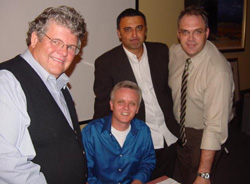 Denis
Sheridan, Adelaide's King of Swing is Paul's cousin and was happy
to slip on the tuxedo and two tones and belt out 'Mack the Knife'
for a good cause. Denis's daughter Meg, a DJ on Adelaide radio
quickly volunteered to drive the steel wheels and supply a soundtrack
for the night. As the group planned to auction off some items,
an auctioneer was needed. The challenge was to find someone in
the Moran clan who had a loud voice, loved telling a story or
three and enjoyed being the centre of attention. After interviewing
every male over the age of nine in the extended Moran family
it was discovered that all of them were over-qualified for the
job. In the end the gig went to John Moore, Paul's cousin who
apart from being the best man for the job is also an auctioneer
by trade. Simple really. Lastly, an MC was needed and the group
looked no further than Michael Pratt, a family friend and a very
funny man. Denis
Sheridan, Adelaide's King of Swing is Paul's cousin and was happy
to slip on the tuxedo and two tones and belt out 'Mack the Knife'
for a good cause. Denis's daughter Meg, a DJ on Adelaide radio
quickly volunteered to drive the steel wheels and supply a soundtrack
for the night. As the group planned to auction off some items,
an auctioneer was needed. The challenge was to find someone in
the Moran clan who had a loud voice, loved telling a story or
three and enjoyed being the centre of attention. After interviewing
every male over the age of nine in the extended Moran family
it was discovered that all of them were over-qualified for the
job. In the end the gig went to John Moore, Paul's cousin who
apart from being the best man for the job is also an auctioneer
by trade. Simple really. Lastly, an MC was needed and the group
looked no further than Michael Pratt, a family friend and a very
funny man.
-
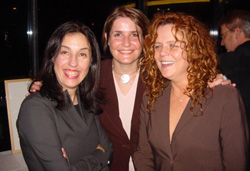 The
word got out and the dinner was a sell out. Paul could always
draw a crowd. Over 120 people signed up for a good cause and
a good night. Items to be auctioned were sourced from friends
and well wishers all over the world. Holidays to Brunei, complimentary
beer (yep, Coopers), submarine rides from the Navy, winery tours,
a Don Bradman bat, a first prize of two airline tickets to Sydney
(and a second prize of four airline tickets to Sydney) were just
a few of the things that were generously donated. The
word got out and the dinner was a sell out. Paul could always
draw a crowd. Over 120 people signed up for a good cause and
a good night. Items to be auctioned were sourced from friends
and well wishers all over the world. Holidays to Brunei, complimentary
beer (yep, Coopers), submarine rides from the Navy, winery tours,
a Don Bradman bat, a first prize of two airline tickets to Sydney
(and a second prize of four airline tickets to Sydney) were just
a few of the things that were generously donated.
- Pauline Killey and Patrine Quist
also from the Clan Moran raised the whole tone of the event by
just turning up. However they did much more, they organised the
decor of the room, created the place settings and made sure the
dinner actually happened. Without them, the fearless group of
eight would still be sitting in the members bar discussing how
much the Bradman bat might get.
-
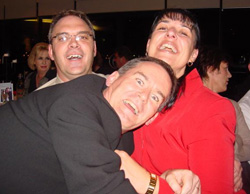 On
the night, people from Adelaide, Brisbane, Sydney, Melbourne,
Taipei, Brunei and Singapore all converged on the Glenelg Footy
club to remember their friend and family member and to help out
Ivana and Tara. Paul's mother Kath, and other close family members
were the evening's guests of honour. A number of Paul's work
colleagues from the ABC including his boss John Tulloch made
the trip from Sydney. A camera crew was present to take footage
of the night for a documentary about Eric Campbell to be shown
on the program, Australian Story. As guests arrived they were
greeted by a string quartet made up of music students of Paul's
school friend, Michael Griffin. This was going to be a classy
affair after all. Amoung the crowd were many other friends from
Paul's school Sacred Heart College, fellow salty seadogs from
1st Holdfast Bay Sea Scouts, team mates from Postels Football
club and old friends from Channel Nine where Paul got his first
start in television. Obviously not all of Paul's many friends
around the world could make it on the night so some made generous
donations, particularly Paul's friend in the US John Rendon. On
the night, people from Adelaide, Brisbane, Sydney, Melbourne,
Taipei, Brunei and Singapore all converged on the Glenelg Footy
club to remember their friend and family member and to help out
Ivana and Tara. Paul's mother Kath, and other close family members
were the evening's guests of honour. A number of Paul's work
colleagues from the ABC including his boss John Tulloch made
the trip from Sydney. A camera crew was present to take footage
of the night for a documentary about Eric Campbell to be shown
on the program, Australian Story. As guests arrived they were
greeted by a string quartet made up of music students of Paul's
school friend, Michael Griffin. This was going to be a classy
affair after all. Amoung the crowd were many other friends from
Paul's school Sacred Heart College, fellow salty seadogs from
1st Holdfast Bay Sea Scouts, team mates from Postels Football
club and old friends from Channel Nine where Paul got his first
start in television. Obviously not all of Paul's many friends
around the world could make it on the night so some made generous
donations, particularly Paul's friend in the US John Rendon.
-
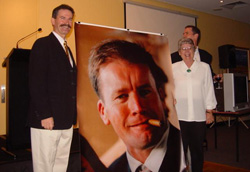 Dominating
the stage area was an enlarged photo of Paul. The photo said
more about Paul than any speech could. The photo showed him uncharacteristically
dressed in a suit with a cigar firmly clamped in his teeth, Texan
style. Paul looked like a successful politician on election night.
But for those of us who knew him it was not a look of arrogance
or grand self confidence, it was a look of warmth, humour and
fun. It was Paul. Dominating
the stage area was an enlarged photo of Paul. The photo said
more about Paul than any speech could. The photo showed him uncharacteristically
dressed in a suit with a cigar firmly clamped in his teeth, Texan
style. Paul looked like a successful politician on election night.
But for those of us who knew him it was not a look of arrogance
or grand self confidence, it was a look of warmth, humour and
fun. It was Paul.
-
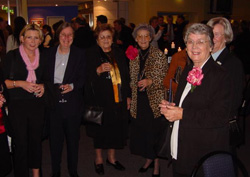 As
the guests were seated a Scottish Pipe band entered the room
playing a rousing rendition of Amazing Grace. Nothing like the
bagpipes to quieten down a crowd and allow a little inner contemplation.
Michael Pratt then picked things up with a few killer one liners
that made it clear this was going to be a night of celebration
and fun. Andrew Porteous, Paul's close friend made a short speech
on behalf of Ivana and the organising group and then a film montage
of work done by Paul was played. This included video that Paul
had shot for friends and family as well as snippets from his
documentary about refugees stranded in Cyprus. The montage was
an outstanding piece that was skillfully put together by Paul's
friend and old work colleague, Jeff Clayfield. It was wonderful
tribute to Paul's work. John Moore handled the auction with humour
and purpose and displayed a deft skill at raising money, he was
so good he could make a living out of it.... As
the guests were seated a Scottish Pipe band entered the room
playing a rousing rendition of Amazing Grace. Nothing like the
bagpipes to quieten down a crowd and allow a little inner contemplation.
Michael Pratt then picked things up with a few killer one liners
that made it clear this was going to be a night of celebration
and fun. Andrew Porteous, Paul's close friend made a short speech
on behalf of Ivana and the organising group and then a film montage
of work done by Paul was played. This included video that Paul
had shot for friends and family as well as snippets from his
documentary about refugees stranded in Cyprus. The montage was
an outstanding piece that was skillfully put together by Paul's
friend and old work colleague, Jeff Clayfield. It was wonderful
tribute to Paul's work. John Moore handled the auction with humour
and purpose and displayed a deft skill at raising money, he was
so good he could make a living out of it....
-
- As the night carried on the
food was demolished, the drink enjoyed and the crowd got to see
Denis and Meg Sheridan hit their straps, Glenelg Footy Club style.
Las Vegas may not have seen anything quite like it, but the crowd
loved it. As the night progressed the room got louder, the stories
of Paul taller and the donations larger.
-
- By the end of the evening it
was mission accomplished. A lot of money, glasses and cheerful
voices had been raised on the night. Two of Paul's brothers,
Greg and Gerry, spoke on behalf of the family. They thanked all
who had contributed to making the night such a success both for
those who attended and for those who benefited. Later as the
crowd wandered out of the room the organisers agreed over a final
ale that the night had indeed been a success for one other reason.......Paul
would have loved it !
 A
BOOK PAYS A TRIBUTE TO JOURNALISTS By Chris Cramer, November
2003 A
BOOK PAYS A TRIBUTE TO JOURNALISTS By Chris Cramer, November
2003
A new book pays tribute to the journalists killed in the last
Gulf war. Could their deaths have been avoided, asks CNN's Chris
Cramer.
One of the most damning indictments of the media profession is
that reporters provide the ink "and others provide the blood".
By publishing Dying To Tell The Story, the International News
Safety Institute has produced a profoundly moving but very fitting
tribute to the 16 members of the media who, during the war in
Iraq in the spring of 2003, provided both the ink and the blood.
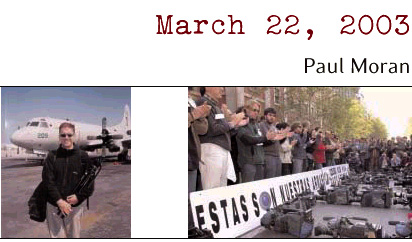 It has been estimated that several
thousand members of the media were deployed in the days and weeks
leading up to the coalition attack on Iraq, which began on March
20 2003. They were stationed in northern Iraq, in Baghdad, in
Kuwait, in the Gulf states, and about 600 as "embedded"
and pool media with the US and British armed forces. It has been estimated that several
thousand members of the media were deployed in the days and weeks
leading up to the coalition attack on Iraq, which began on March
20 2003. They were stationed in northern Iraq, in Baghdad, in
Kuwait, in the Gulf states, and about 600 as "embedded"
and pool media with the US and British armed forces.
The assignment they were about to cover coincided with a low-water
mark for the safety of the media profession. Journalists have
always been casualties during the conflicts they are sent to
cover. And yet, in recent years, a worrying trend has emerged.
Some individuals, factions and regimes around the world have
come to regard members of the media as "legitimate targets"
for harassment, robbery, assault and even murder. The kidnapping,
and subsequent brutal execution, of Daniel Pearl in Pakistan,
while he was investigating a story for the Wall Street Journal
in February 2002, horrified the world and heightened the mounting
fears in the news community.
This year, during the brief period between March 22 and May 9,
many more correspondents, reporters, cameramen, translators,
and support staff did not come back from their assignments.
They were killed by Iraqi fire, by "friendly fire"
from coalition forces, or died from accidents. It was the worst
catalogue of deaths, in such a short time, in media history;
certainly since a similar period in Vietnam in 1971. And yet
it was perhaps inevitable, given the huge numbers of newspaper,
magazine, television and radio personnel sent on assignment to
Iraq and the surrounding countries in preparation for the controversial
assault on Saddam Hussein's regime.
Many of the tributes in Dying To Tell The Story come from the
giants of the print and broadcasting industry - the BBC's World
Affairs editor John Simpson, NBC's Tom Brokaw, ITV's head of
news David Mannion, John Tulloh of Australia's ABC, Cullen Murphy
from Atlantic Monthly, and Jim Smith from the Boston Globe.
However, Dying To Tell The Story is not just a historical tribute
to those colleagues who died in and around Iraq in March, April
and May of this year. It also looks in detail at many of the
issues that surround and confront the profession in the 21st
century: the role of freelances, who are frequently without the
financial and institutional support of their staff counterparts;
the work of the organisations that have been set up to provide
safety training and security for journalists; and the real fears
among many that journalists and media organisations, such as
the emerging Arab broadcasters, are being "targeted",
because of the influence they command.
The closing chapter of the book tackles the highly emotive issue
of post-traumatic stress disorder among journalists. It includes
details of the first study of the work of journalists in war
zones. It was conducted by Dr Anthony Feinstein, a clinical psychologist
from the University of Toronto, and many would say the foremost
mind in the area of PTSD among the media profession.
PTSD is a relatively new description for the symptoms some people
suffer after being exposed to a traumatic experience, a condition
more crudely referred to in past decades as combat fatigue, war
neurosis, shell shock, or just hysteria. Feinstein's groundbreaking
work with journalists, other members of the media and, importantly,
their families, is part of a new realisation that journalists
can be affected by the stories they cover. And that news editors
can also be wracked with guilt when staff they assign to war
zones get killed or injured.
Dying To tell The Story turned into a labour of love for everyone
involved. The emotion, pain and laughter in the pages bear witness
to the commitment that drives everyone in this profession.
They were there, in the words of Larry Burrows of Life Magazine,
the legendary combat photographer, "to show the interested
people and to shock the uninterested". (Burrows died when
the helicopter he was traveling in with three other photojournalists
was shot down by Vietcong troops over Laos in 1971).
Three decades later, his words are a fitting epitaph for the
heroes of this book, a work that honours all those who died and
continue to die in the name of journalism.
· Chris Cramer is managing director, CNN International
networks and honorary president, International News Safety Institute,
who publish Dying To Tell The Story (£14). All proceeds
go to journalism charities.
-
- Contact: www.newssafety.com or Sarah de Jong,
safety@ifj.org or
tel: + 32 2 235 22 01
MediaGuardian.co.uk © Guardian Newspapers Limited 2004
 LONDON HOME HOUSE MEMORIAL - By
Allison Harvey, May 2003 LONDON HOME HOUSE MEMORIAL - By
Allison Harvey, May 2003
-
 On
May 30th, 2003, over 70 family members and friends gathered at
one of London's most beautiful private clubs at 20, Portman Square,
Home House. The evening was spent in the Etruscan Room, with
its adjoining balcony over looking the gardens. It was exceptionally
warm. The French cheeses melted, but the champagne remained icy,
just as Paul liked it. The guests celebrated the life of one
the most joyous, talented and generous men anyone had ever known.
Organizers chose this venue, as Paul loved it here. Whenever
he travelled to London, he always loved to come to Home House
to enjoy spending time with his mates and share his stories of
life on the road, his wife, his plans, his dreams. This was his
place in London. On
May 30th, 2003, over 70 family members and friends gathered at
one of London's most beautiful private clubs at 20, Portman Square,
Home House. The evening was spent in the Etruscan Room, with
its adjoining balcony over looking the gardens. It was exceptionally
warm. The French cheeses melted, but the champagne remained icy,
just as Paul liked it. The guests celebrated the life of one
the most joyous, talented and generous men anyone had ever known.
Organizers chose this venue, as Paul loved it here. Whenever
he travelled to London, he always loved to come to Home House
to enjoy spending time with his mates and share his stories of
life on the road, his wife, his plans, his dreams. This was his
place in London.
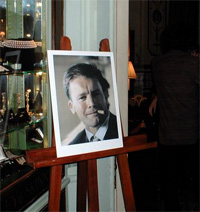 The rooms were decorated with
Paul's wonderful photographs of the region he loved: The Middle
East. Ivana Moran collected the best 30 photographs taken by
Paul in Bahrain, Egypt, Northern Iraq and beyond. She then gave
these to graphics designer Jen McIntosh who framed them and hung
them around the rooms. Invitees, from London, Cyprus, Glasgow,
Paris, Bangkok, Belgrade, Morbegno, Seattle, Vernon, Washington
DC and elsewhere admired his works and smiled at his hunger for
culture and art. Paul Moran was an accomplished man. This memorial
not only honoured his incredible life but also showcased his
talent. The rooms were decorated with
Paul's wonderful photographs of the region he loved: The Middle
East. Ivana Moran collected the best 30 photographs taken by
Paul in Bahrain, Egypt, Northern Iraq and beyond. She then gave
these to graphics designer Jen McIntosh who framed them and hung
them around the rooms. Invitees, from London, Cyprus, Glasgow,
Paris, Bangkok, Belgrade, Morbegno, Seattle, Vernon, Washington
DC and elsewhere admired his works and smiled at his hunger for
culture and art. Paul Moran was an accomplished man. This memorial
not only honoured his incredible life but also showcased his
talent.
 But the evening also showcased
his greatness as a husband, father and friend. Ivana Moran, Zaab
Sethna and Allison Havey spoke on this evening. Ivana spoke about
their magical love; She said "You know the films "The
English Patient" and "Shakespeare in Love"? Well,
they have nothing on us!" The guests laughed, choking back
their tears. Zaab spoke about their time together in Kosovo and
beyond. Zaab was a dear friend to Paul and we always knew when
he came to London that we would have to share him with Zaab.
Allison spoke about his love of Home House and how much he enjoyed
spending time here. We agreed that we would celebrate his 40th
birthday by granting him the gift of always looking out for his
girls, his wife Ivana and his beautiful Tara. We all hoped he
listened in throughout the evening. John Rendon and his company
produced an excellent video celebrating his time with the Rendon
Group. The collected stills showed a young Paul at work in Kuwait,
in DC and his exuberant face made us all wistful for the man
we loved so much. But the evening also showcased
his greatness as a husband, father and friend. Ivana Moran, Zaab
Sethna and Allison Havey spoke on this evening. Ivana spoke about
their magical love; She said "You know the films "The
English Patient" and "Shakespeare in Love"? Well,
they have nothing on us!" The guests laughed, choking back
their tears. Zaab spoke about their time together in Kosovo and
beyond. Zaab was a dear friend to Paul and we always knew when
he came to London that we would have to share him with Zaab.
Allison spoke about his love of Home House and how much he enjoyed
spending time here. We agreed that we would celebrate his 40th
birthday by granting him the gift of always looking out for his
girls, his wife Ivana and his beautiful Tara. We all hoped he
listened in throughout the evening. John Rendon and his company
produced an excellent video celebrating his time with the Rendon
Group. The collected stills showed a young Paul at work in Kuwait,
in DC and his exuberant face made us all wistful for the man
we loved so much.
 The guests spoke amongst themselves,
sharing stories of times spent with Paul. But while all of us
missed him, there was certainly a celebratory feeling in the
air. With his oh so handsome smiling face smoking a cigar on
his wedding day in an enlarged photograph greeting us at the
door, we remembered Paul for so many things. Paul remains a wonderful
friend, a loving husband, father and a colleague who we can always
spiritually debate issues with. There really has never been anyone
like Paul Moran. But for those of us lucky enough to have known
him, we can still call on his advice, his reactions, his opinions
and beyond all else, his hearty laugh. This is a fuel for all
of us to run on, remember and it will certainly influence us
all our lives. The guests spoke amongst themselves,
sharing stories of times spent with Paul. But while all of us
missed him, there was certainly a celebratory feeling in the
air. With his oh so handsome smiling face smoking a cigar on
his wedding day in an enlarged photograph greeting us at the
door, we remembered Paul for so many things. Paul remains a wonderful
friend, a loving husband, father and a colleague who we can always
spiritually debate issues with. There really has never been anyone
like Paul Moran. But for those of us lucky enough to have known
him, we can still call on his advice, his reactions, his opinions
and beyond all else, his hearty laugh. This is a fuel for all
of us to run on, remember and it will certainly influence us
all our lives.
To Paul, Thank You for All You have Shared with Us. We Honour
you Throughout our Lives. We Love You Always.
 THE PAUL MORAN MEMORIAL TROPHY
- By Mark Seaman, March 2005 THE PAUL MORAN MEMORIAL TROPHY
- By Mark Seaman, March 2005
-
 During
a season in which Awali CC finished as runners up in the Bahrain
Cricket Association 2nd Division of the 50 over league, thereby
achieving promotion to the Premier Division, it could be expected
that a number of excellent individual performances have taken
place. During
a season in which Awali CC finished as runners up in the Bahrain
Cricket Association 2nd Division of the 50 over league, thereby
achieving promotion to the Premier Division, it could be expected
that a number of excellent individual performances have taken
place.
Paul's cricket bat framed in club's premises
Left: Sanjay Rathod, right: Ben O'Brien
- Outstanding bowling performances
have been rarer, with only the hat-trick achieved by veteran
Guy Parker standing out as noteworthy.
During 2004/5 however, one player has stood out consistently,
with his heavy
run-scoring, wicket taking bowling and occasional sharp slip
fielding - the Paul Moran award is given for ONE outstanding
performance however, and it is appropriate that the most consistent
player also has the most outstanding performance, scoring 234
not out from a total of 394 for 6 against Godfathers CC.
-
- The Paul Moran trophy winner
is Sanjay Rathod.
-
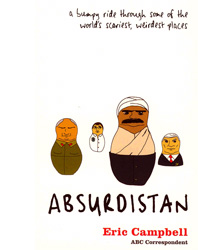  ABSURDISTAN - By Eric Campbell, April 2005
ABSURDISTAN - By Eric Campbell, April 2005
-
- I don't know if Paul would have
approved of a journalist writing a memoir he had a way of gently
reminding reporters that they weren't the main story. But having
heard just a smattering of his anecdotes, I suspect he could
have written a wonderful book or three himself.
-
- My route round the world was
more conventional being a willingly bonded slave of the ABC Foreign
Desk. In 'Absurdistan' I've tried to give a sense of the comedy,
tragedy and farce that characterise the strange life of expatriate
journalism.
-
- But for aspiring foreign correspondents,
Paul's approach to his work might be a better role model. Spending
a year making a documentary about refugees because you care about
their plight is about as rare an occurrence in journalism as
finding snow in the Sahara.
-
- So is falling in love with a
place and a people that the rest of the world was happy to forget
about. I don't know how many hundreds of fishing-vest clad journalists
had made their way into Kurdistan before the Iraq war. But I'm
certain Paul was among the very few who understood the place
completely and genuinely cared about its future.
-
-
 BOOKS
FOR THE SCHOOL IN IRAQ - By Veronica Harrison and Nicolas Clarens,
July 2006 BOOKS
FOR THE SCHOOL IN IRAQ - By Veronica Harrison and Nicolas Clarens,
July 2006
-
- Paul's friend Nicholas has done
a wonderful job trying to help and contribute building a School
Library in Iraq to Paul's memory. This is an interview with Nicolas,
a French language teacher at Craneleigh School, UK. Nicolas's
talent and dedication are wonderfully evident wherever he visits.
Here is the interview the Craneleigh school librarian registered
with Nicolas:
-
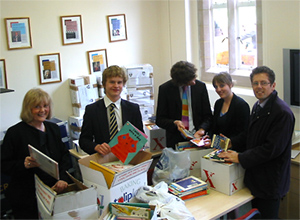  The library in Iraq is in memory of your
friend the journalist Paul Moran who tragically died in Baghdad
at the beginning of the current conflict in 2003. How long had
you known Paul and his wife Ivana ? The library in Iraq is in memory of your
friend the journalist Paul Moran who tragically died in Baghdad
at the beginning of the current conflict in 2003. How long had
you known Paul and his wife Ivana ?
-
- I met them when I worked in
Bahrain 6 years ago now. Ivana was one of my pupils at the Language
Institute for Adult Education that I worked for at the time.
Ivana was attending my lessons for the advanced group. We got
on very well and when I met her husband Paul I found him to be
very interesting to listen to as he had traveled extensively
in the Middle East, particularly during the first war in Iraq.
-
 Was it her idea to found the website
www.paulmoran.org
in his memory ? Was it her idea to found the website
www.paulmoran.org
in his memory ?
-
- Ivana was devastated to lose
Paul as you can imagine, even more so as she just gave birth
to Tara a few weeks before Paul died. She did not want Paul to
be forgotten and hoped to pass something of him to their daughter
for when she is grown up. Ivana is a very strong person and she
has worked very hard to cope with the situation by herself. She
decided a website should be created as a testimony of the work
her husband did. She then started to sell Paul's very dramatic
and poignant pictures and she put the money into a charity.
Straight from the beginning, I remember Ivana's intention was
to help the victims of the war that Paul used to report upon
so well. Such as Iraq, Israel, Bosnia, Kosovo etc. Ivana contacted
Unicef Australia (Paul was Australian) and it is Unicef who came
up with the idea of a Library, which could be named after Paul.
The Ranj school, located in the Kurdistan region of Iraq, in
the Erbil district was picked because that is the region where
Paul's life was ended in a suicide bomb attack near the border.
-
 Who is the Library for ? Who is the Library for ?
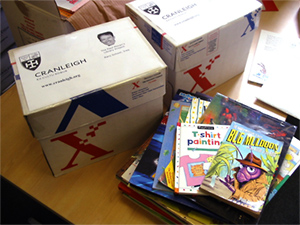 This project
is such an exciting one! The Ranj School is a big school, around
830 pupils attend it. It is a very run down school with very
little sanitation facilities. The headmaster of the school has
agreed with Unicef Australia to convert two rooms into a library,
as there is no such facility at the moment.
We tend to be overwhelmed
by the bad publicity that surrounds the conflict in Iraq but
in this case, we have a really constructive plan to help the
children. This project
is such an exciting one! The Ranj School is a big school, around
830 pupils attend it. It is a very run down school with very
little sanitation facilities. The headmaster of the school has
agreed with Unicef Australia to convert two rooms into a library,
as there is no such facility at the moment.
We tend to be overwhelmed
by the bad publicity that surrounds the conflict in Iraq but
in this case, we have a really constructive plan to help the
children.
-
 How do you think this will change the
lives of the children ? How do you think this will change the
lives of the children ?
-
- I think a library is a neutral
place and a peaceful place to go and to relax. It is hard to
think pupils just don't have a place to go. They are so many
of them. I have managed to select with a massive help from Veronica
Harrison, Cranleigh School librarian a whole range of books for
all ages, from nursery age to adult.
It will take time for the local community to be able to read
reference books and novels but we have been very lucky in that
we have been given a lot of books for toddlers, which is the
crucial kind of resource a library needs to encourage young children
to read in English. Finally, I believe there are enough reference
books and dictionaries that could be used by teachers. Hopefully
the Paul Moran's library will become a place where young people
enjoy going to and it will be considered as a calm and peaceful
place as befits the memory of a good man and a dear friend.
-
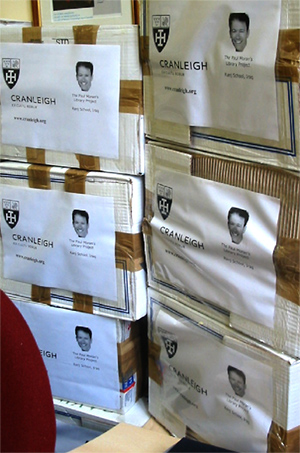
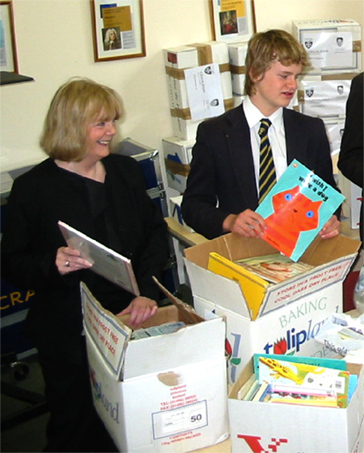
-
|